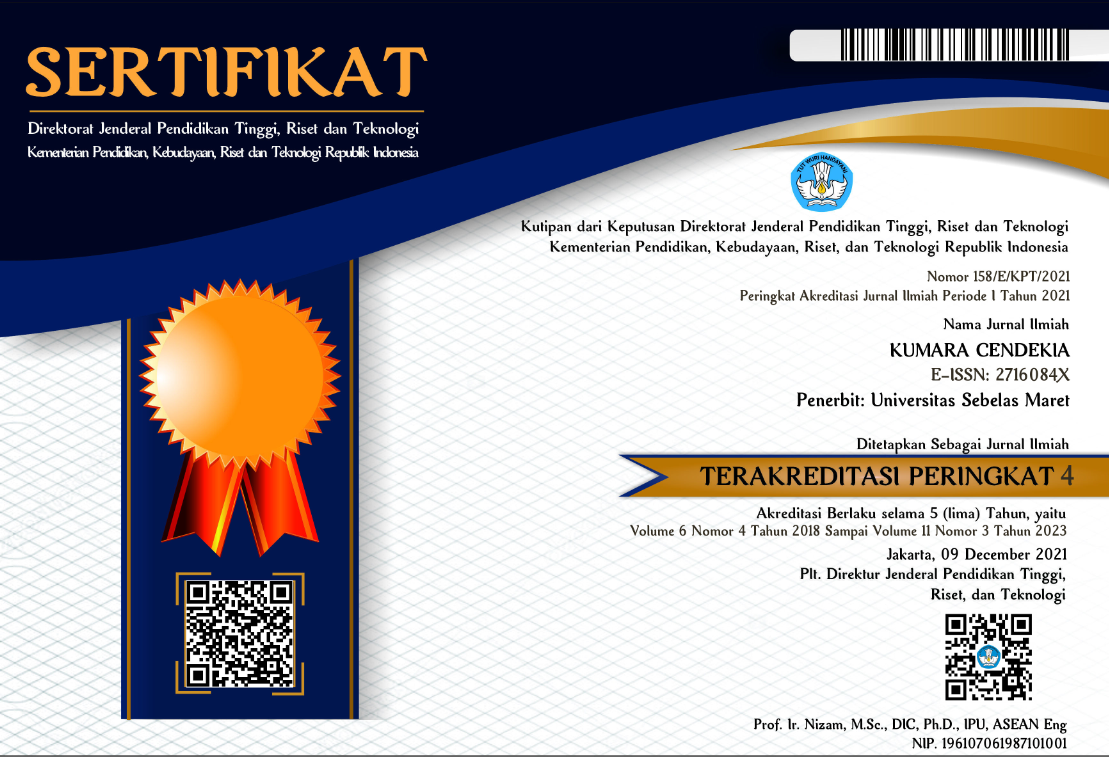PENGARUH THE ORFF APPROACH TERHADAP PEMAHAMAN POLA ANAK USIA DINI
Abstract
Salah satu ranah perkembangan kognitif pada kelompok anak usia dini adalah kemampuan memahami pola. Penelitian ini dilaksanakan untuk mengetahui pengaruh metode The Orff Approach pada pemahaman pola anak usia dini. Riset ini dilakukan dengan metode kuantitatif eksperimen, dan menggunakan metode Quasi Experimental Design, dengan desain Nonequivalent Control Group Design. Pengumpulan sampel dalam penelitian ini dilakukan dengan teknik Sampling Jenuh. Kelompok anak usia dini dengan usia 4 sampai dengan 5 tahun yang berjumlah 24 orang diputuskan sebagai subjek penelitian. Dalam penelitian ini, penulis menggunakan tes sebagai metode pengumpulan data. Uji validitas menggunakan validitas konsrtuk. Uji normalitas dan uji homogenitas menggunakan Shapiro-Wilkdan Levene test for Equality of Variance. Analisis data menggunakan statistic parametric dengan uji–t, berupa uji Independent Sample t-test. Melalui hasil dari penelitian ini, disimpulkan bahwa The Orff Approach berpengaruh terhadap pemahaman pola anak usia dini. Hal ini terlihat dari peningkatan hasil rata – rata posttest kelompok eksperimen.Posttest kelompok esperimen menunjukkan 12,92 dari pretest nya 10,00.Berdasarkan hasil penelitian, diketahui bahwa The Orff Approach mampu diterapkan dalam disiplin ilmu lainnya.
Keywords
Full Text:
PDF (Bahasa Indonesia)References
AOSA. (2011). What is Orff-Schulwerk? http://www.aosa.org/orff/
Arslan, A. (2009). Orff schulwerk elementary music applications in interdisciplinary education in chair of primary school education. Procedia - Social and Behavioral Sciences, 1(1), 2546–2551.
Beaty, J. (2013). Observasi Perkembangan Anak Usia Dini. Kencana Prenadamedia.
Bilen, S. (2010). The effect of cooperative learning on the ability of prospect of music teachers to apply Orff-Schulwerk activities. Procedia - Social and Behavioral Sciences, 2(2), 4872–4877.
Bilhartz, T. D., Bruhn, R. A., & Olson, J. E. (1999). The effect of early music training on child cognitive development. Journal of Applied Developmental Psychology, 20(4), 615–636.
Campbell, L., Campbell, B., & Dickinson, D. (1996). Teaching and Learning Through Multiple Intelligences. Allyn & Bacon.
Ching, B. H. H. (2017). Mathematics anxiety and working memory: Longitudinal associations with mathematical performance in Chinese children. Contemporary Educational Psychology, 51, 99–113.
Collins, M. A., & Laski, E. V. (2015). Preschoolers’ strategies for solving visual pattern tasks. Early Childhood Research Quarterly, 32, 204–214.
Fyfe, E. R., Mcneil, N. M., & Rittle-Johnson, B. (2015). Easy as ABCABC: Abstract Language Facilitates Performance on a Concrete Patterning Task. Child Development, 86(3), 927–935.
Helvacı, A. (2015). The Content Assessment of Pre-School Education Program in Turkey Towards Music Education. Procedia - Social and Behavioral Sciences, 197(February), 2454–2458.
Kemendikbud. (2014). Permendikbud nomor 137 Tahun 2014 tentang Standar Nasional Pendidikan Anak Usia Dini. Kementrian Pendidikan dan Kebudayaan.
Kostelnik, M. J., Soderman, A. K., & Whiren, A. P. (2017). Developmentelly Appropriate Practices (5th ed.). Kencana Prenadamedia.
Lestari, K. W. (2011). Konsep Dasar Matematika Anak Usia Dini. Kementrian Pendidikan Nasional.
Long, A. (2013). Involve Me : Using the Orff Approach within the Elementary Classroom.
Mulligan, J., & Mitchelmore, M. (2009). Awareness of pattern and structure in early mathematical development . Mathematics Education Research ... Awareness of Pattern and Structure in Early Mathematical Development. Mathematics Education Research Journal, 21(May), 33–49.
Özeke, S. (2009). Connections between the constructivist-based models for teaching science and music. Procedia - Social and Behavioral Sciences, 1(1), 1068–1072.
Register, D. M., & Hilliard, R. E. (2008). Using Orff-based techniques in children’s bereavement groups: A cognitive-behavioral music therapy approach. Arts in Psychotherapy, 35(2), 162–170.
Reys, E. R., M.N., S., M.M., L., & N.L., S. (1998). Helping Children Learn Mathematics (5th ed.). Allyn & Bacon.
Riedesel, A., Schwartz, J. E., & Clements, D. H. (1996). Teaching Elementary School Mathematics (6th ed.). Allyn & Bacon.
Rittle-Johnson, B., Fyfe, E. R., McLean, L. E., & McEldoon, K. L. (2013). Emerging Understanding of Patterning in 4-Year-Olds. Journal of Cognition and Development, 14(3), 376–396.
Smith, A. M., & Prince, A. J. (2012). Mathematics In Early Years Education (3rd ed.). Routledge.
Refbacks
- There are currently no refbacks.












